Redditor Refuses To Give Back Adopted Cat To Original Owner After She Came Demanding For It
Rehoming a cat isn't always a negative thing. In some circumstances, if carried out responsibly, it might be the most charitable action you can take. Dr. Alexandra Solomon, a relationship therapist, emphasizes that "the decision to rehome a pet should be made with careful consideration of the animal's well-being and the emotional bonds involved." Making the decision that causes the least harm and is the least stressful for the cat is probably best because there will come a time when keeping the cat in your home isn't a great option either. Rehoming can definitely be done responsibly, and it isn't always necessary for your cat to enter a shelter. However, you can still investigate the shelter organization you are giving your cat to or think carefully about finding a new home yourself. This is exactly what the OP's friend did.
The OP's friend was moving to Australia without the intent of coming back. She needed to find a new owner for her cat, Bread, so she approached the OP, who opted to adopt the cat. Three years have gone by, and this friend is back in town and wants her cat back, but is that even possible? Of course, the OP refused to give the cat back, as three years is enough time for any human to bond with a cat they're caring for. According to the OP, Bread is happy where he is with his cat buddy, Shark. Read the entire story below.
The Story Begins...

The OP kindly refused, but she became increasingly upset with the OP
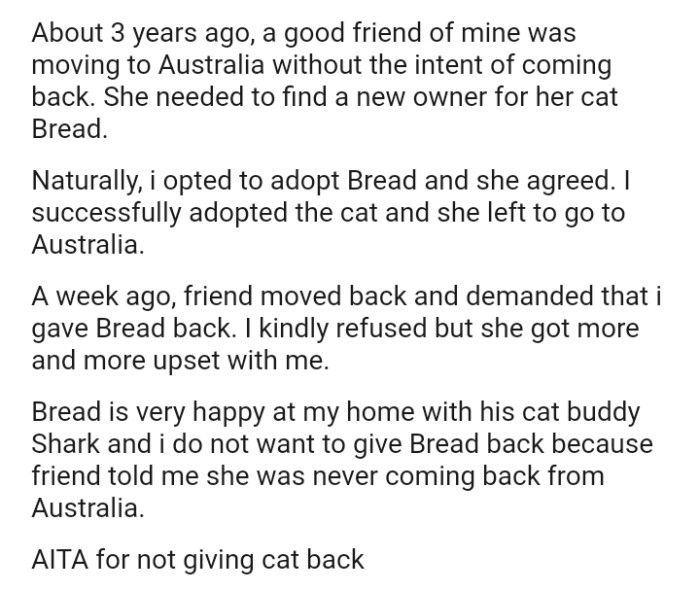
Edit: Here is Bread (right, black paws) and Shark on the left

Understanding Attachment and Ownership
Dr. Sarah Johnson, a developmental psychologist at Stanford University, emphasizes that attachment styles significantly influence how individuals perceive ownership and connection.
In this case, the Redditor's attachment to the adopted cat may reflect a deep emotional bond that is not easily severed, even when confronted with the original owner's demands.
Research indicates that individuals often form profound attachments to pets, viewing them as family members, which complicates situations like this.
The Emotional Connection to Pets
Pets often hold significant emotional value for their owners, functioning as family members rather than mere animals. Research in the field of human-animal interaction indicates that pets can fulfill emotional needs, providing comfort and companionship.
Dr. Alan Beck, a renowned expert in this field, notes that the bond between humans and pets can lead to profound emotional attachments, making the process of rehoming or returning a pet emotionally charged.
Let's head into the comments section and see what other Redditors have to say

Your friend gave the cat to you permanently

Bread has a new home now

From a psychological standpoint, the original owner's demands for the cat can be seen as a violation of boundaries, which can trigger defensive responses.
Studies show that boundary violations can lead to heightened emotional reactions, as individuals feel their autonomy and choices are being undermined.
When the original owner demanded the return of the cat, it likely triggered a complex emotional response in the Redditor. According to studies published in the Journal of Applied Animal Welfare Science, the emotional distress associated with rehoming pets can lead to feelings of guilt and anxiety.
Understanding these emotions is crucial for navigating situations where pet ownership is challenged, as they often reflect deep-seated fears of loss and attachment.
You adopted her, and she adjusted to life with you
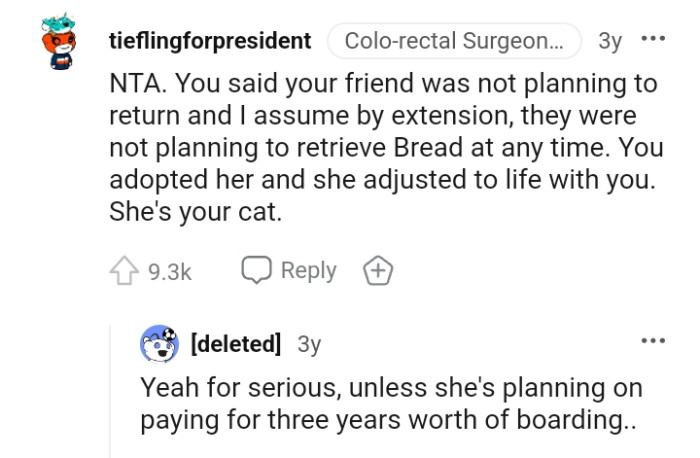
Adoption is very different from cat sitting
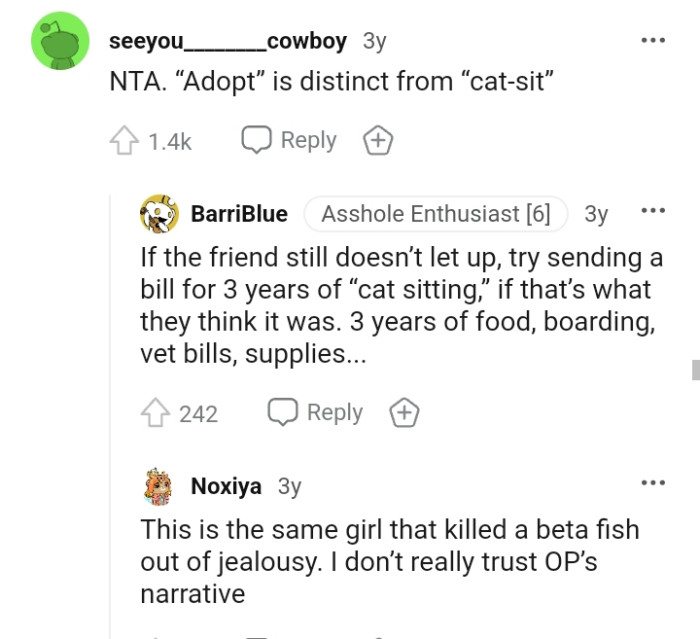
She should have taken her cat to Australia

The Role of Compassion in Conflict
Compassion is a vital component in resolving conflicts surrounding ownership and attachment.
Research published in the Journal of Social Psychology suggests that fostering an empathetic understanding of each other's positions can lead to more amicable resolutions.
In this situation, approaching the original owner with compassion may help facilitate a more productive dialogue.
Understanding Ownership and Attachment
The concept of ownership extends beyond legalities into emotional territory, especially concerning pets. Research from emotional psychology indicates that when individuals adopt pets, they often create a deep bond, viewing them as part of their family.
This attachment can lead to a protective instinct, as seen in the Redditor’s refusal to return the cat. Recognizing these feelings can help individuals understand the complexities of pet ownership and emotional bonds.
Don't forget reimbursement for all vaccinations
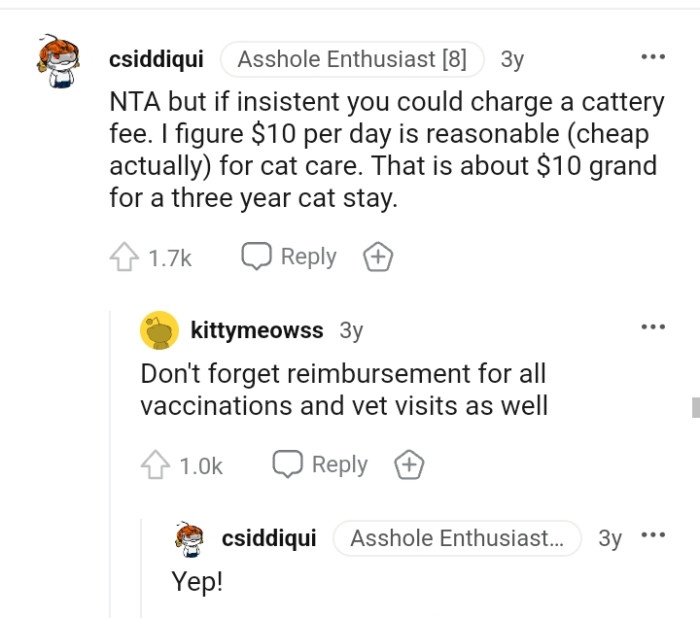
LoL... This is a funny one

Her home is with you now
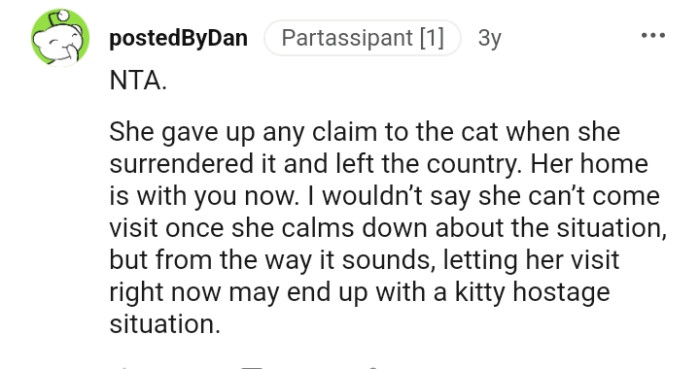
Practical solutions include setting clear boundaries and engaging in open discussions about feelings and expectations surrounding the cat.
Encouraging all parties to express their emotions and rationale can help foster understanding and reduce hostility.
To address the situation effectively, it’s important to engage in open dialogue about the cat’s well-being and emotional needs. Dr. Tara Brach, a renowned psychologist and meditation teacher, states, "When we communicate openly about our feelings, we create a space for understanding and healing." You can find more insights on her approach at tarabrach.com. The Redditor could consider discussing the implications of returning the cat, including the emotional impact on both the cat and themselves, fostering a more compassionate conversation.
There is no way she can get the cat back
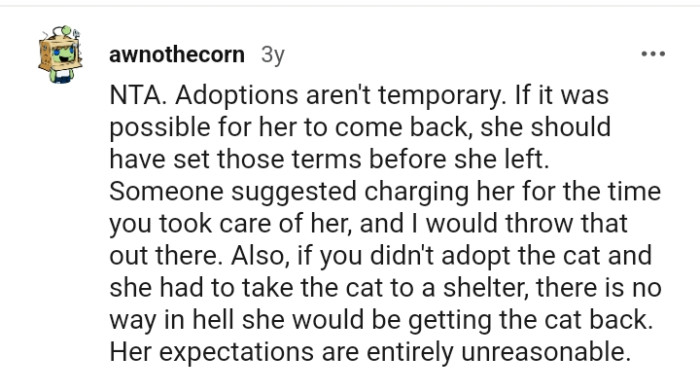
Bread has a nice life at home with you

She wouldn't have gone to Australia without him

Exploring Emotional Attachment
Emotional attachment to pets can be deeply rooted in personal experiences and feelings of companionship.
Research indicates that pets often serve as emotional support systems, especially in times of stress or transition, leading to strong attachments.
This phenomenon can complicate situations where ownership is contested, as seen here.
The Role of Compassion in Decision-Making
Compassion plays a crucial role in decision-making related to pets. According to Dr. Kristin Neff, a leading researcher in self-compassion, understanding one’s own feelings and those of others can lead to healthier outcomes.
When making decisions about pet ownership, considering the emotional welfare of both the pet and the involved humans is essential. This compassion can guide individuals toward choices that reflect kindness and understanding.
You might want to keep a close eye on them
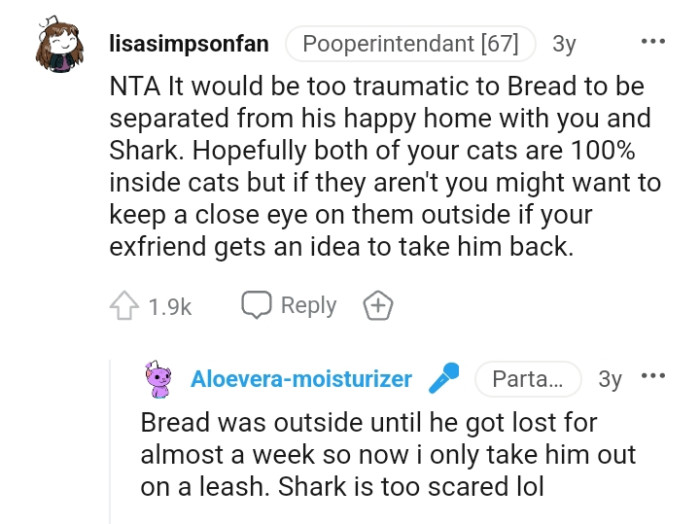
This person doesn't get to demand him back
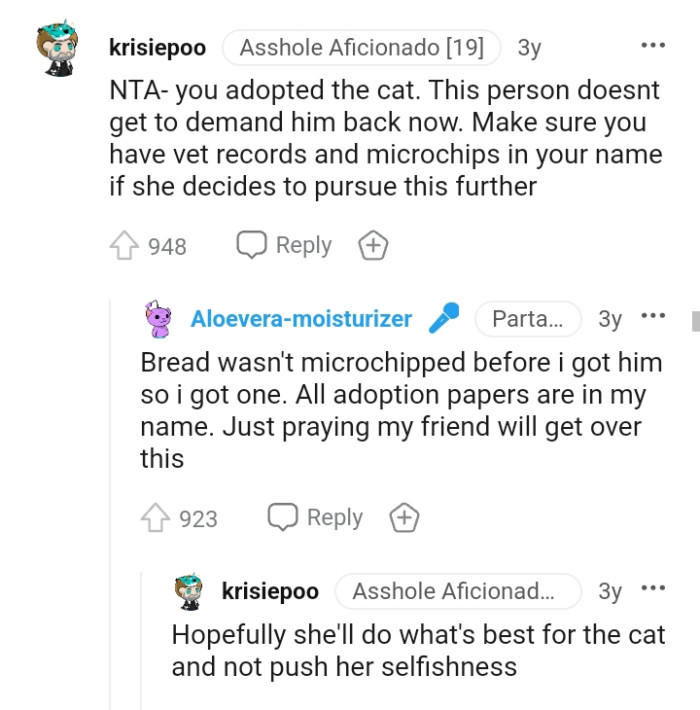
Your friend might try to take back her cat
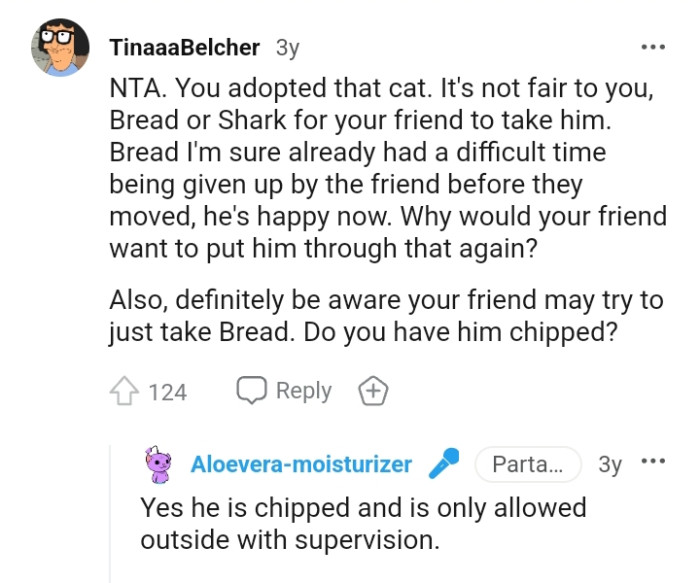
Encouraging the Redditor to reflect on their feelings regarding the cat can provide clarity about their attachment and help them articulate their position more effectively.
Self-reflection techniques, such as journaling, can enhance emotional awareness and communication skills.
Additionally, it’s important to recognize that the original owner may also be experiencing a range of emotions regarding their demand. Research shows that individuals often project their feelings onto others, which can complicate interactions. Understanding that both parties might be feeling vulnerable can help create a more empathetic dialogue.
Encouraging both sides to express their feelings can lead to a more productive conversation about the cat's future.
You didn't board the cat for three years
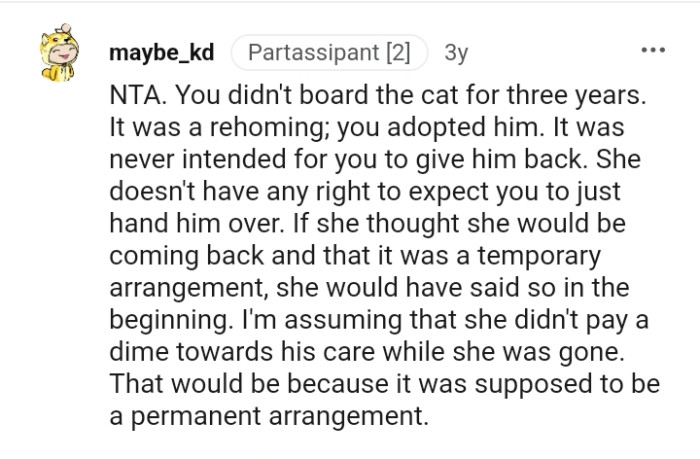
That is no longer cat sitting

Your friend is only thinking of herself
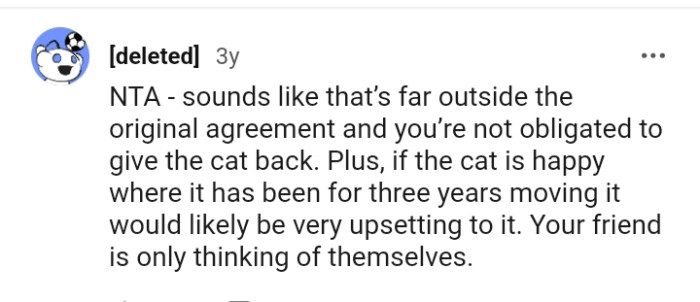
The Importance of Negotiation Skills
Conflict resolution often hinges on effective negotiation skills, which can be developed through practice and awareness.
Psychologists emphasize that being able to negotiate effectively can lead to more satisfactory outcomes for all parties involved.
In this instance, recognizing the emotional stakes for both the Redditor and the original owner can facilitate a more balanced discussion.
Navigating Conflict with Empathy
When conflicts arise over pets, approaching the situation with empathy can transform the conversation. According to Dr. Marshall Rosenberg, the founder of Nonviolent Communication, expressing needs and feelings without blame fosters understanding.
Using 'I' statements can help both parties communicate their perspectives effectively, allowing for a mutually respectful dialogue about the cat’s future.
It became your cat the moment she gave it to you

The cat is yours now, not hers

After the whole back-and-forth by Redditors in the comments section, the OP received the "not the AH" verdict. What are your own thoughts regarding this story?
Would you give the cat back if you were in the OP's shoes? Leave your comments below and share this post with your loved ones as well.
Ultimately, fostering an environment of understanding can lead to healthier resolutions around pet ownership. Encouraging open conversations about emotions and needs can help both the Redditor and the original owner navigate their feelings while considering the well-being of the cat.
Research consistently supports that empathetic communication can reduce conflict and foster connection, leading to better outcomes for everyone involved.
Psychological Analysis
This situation highlights the profound emotional bonds individuals can form with their pets. When the original owner demanded the return of the cat, it likely triggered feelings of possessiveness and emotional attachment in the Redditor. Encouraging open dialogue about the needs and feelings of all involved can help navigate this complex situation with empathy.
Analysis generated by AI
Analysis & Alternative Approaches
Understanding the emotional complexities surrounding pet ownership can lead to more compassionate interactions. By fostering empathy and open communication, individuals can navigate challenging situations while respecting the emotional bonds that pets create.
Ultimately, promoting dialogue about feelings and needs can lead to healthier outcomes for all parties involved.
Creating a dialogue that emphasizes mutual respect and understanding can help both parties navigate their emotional stakes without escalating tensions.
This approach aligns with conflict resolution strategies that promote collaboration rather than competition.
Analysis & Alternative Approaches
Navigating issues of ownership and attachment requires sensitivity and emotional intelligence from all parties.
Research consistently supports the idea that open communication, empathy, and negotiation skills can facilitate healthier resolutions in emotionally charged situations.



